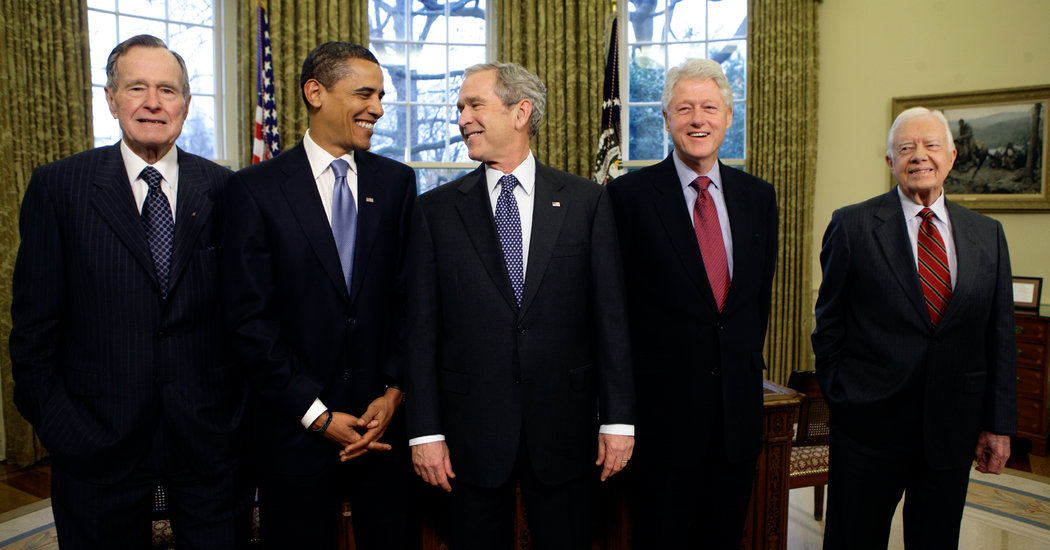
One of George Bush’s lesser-known legacies was the role he played in cementing a modern presidential tradition: leaving a letter of support for the incoming commander in chief on Inauguration Day.
During the 2016 presidential election, an image of President Bush’s letter to the man who defeated him, Bill Clinton, was widely publicized, with many commenting that it was a refreshing reminder of the potential for bipartisanship during a bitterly divisive campaign. Mr. Bush, a Republican, left the letter for his Democratic successor on the Resolute Desk in the Oval Office on Inauguration Day in 1993.
“Your success now is our country’s success,” he wrote. “I am rooting hard for you.”
Mr. Bush left his message of unity despite his contentious campaign against Mr. Clinton that denied him a second term.
Mark K. Updegrove, a presidential historian who wrote a book about the Bush family, said Mr. Bush, who died on Friday night at age 94, continued the custom after Ronald Reagan left him a lighthearted note during their White House transition in 1989.
Reagan used stationery bearing the phrase, “Don’t let the turkeys get you down.” On the bottom, a drawing depicted an elephant — the symbol of the Republican Party — with turkeys climbing on top of it.
Reagan’s letter was a humorous gesture to welcome an old friend to the White House, Mr. Updegrove said, but Mr. Bush’s decision to offer an olive branch to a political foe in his letter was profound. “It showed to me that he was a citizen — not a partisan,” Mr. Updegrove said.
Future White House occupants made it a tradition. Every departing president after Reagan has delivered a letter with words of wisdom and support on Inauguration Day.
In Mr. Bush’s autobiographical book, he described sitting alone in the Oval Office with an empty desk on the day he was scheduled to vacate it.
“I leave a note on the desk for Bill Clinton,” he wrote. “It looks a little lonely sitting there. I don’t want it to be overly dramatic, but I did want him to know that I would be rooting for him.”
In a column published on Saturday in The Washington Post, Mr. Clinton wrote that Mr. Bush’s 1993 letter revealed him to be an “honorable, gracious and decent man who believed in the United States, our Constitution, our institutions and our shared future.”
In turn, Mr. Clinton left a letter on Inauguration Day in 2001 for George W. Bush, writing, “Today you embark on the greatest venture, with the greatest honor, that can come to an American citizen.”
Then, on Jan. 20, 2009, the day Barack Obama was sworn in, George W. Bush left him a note.
“There will be trying moments. The critics will rage,” his letter read. “But, you will have an Almighty God to comfort you, a family who loves you, and a country that is pulling for you, including me.”
Barbara A. Perry, the director of presidential studies at the University of Virginia’s Miller Center, said it makes sense that this presidential custom has only been consistent during the last three decades. For one, the Oval Office, which provides a symbolic repository for the transition letter, did not exist until the beginning of the 20th century.
“The letter is part of a bigger place, a sacred space of that office,” she said. “That letter, when they write it, is their exit from the Oval Office into their post-presidency.”
Professor Perry added that eight presidents have died in office, making them unable to leave behind such a letter. Other presidents — Richard Nixon, for example — did not have a smooth departure.
When Donald J. Trump was inaugurated in January 2017, Mr. Obama left him a letter in the desk drawer of the Oval Office. At the time, Mr. Trump called it a “thoughtful” and “beautiful” letter.
As CNN reported months later, Mr. Obama had written, in part, that “regardless of the push and pull of daily politics, it’s up to us to leave those instruments of our democracy at least as strong as we found them.”
Because Mr. Trump is not exactly known for maintaining presidential norms, historians will be closely watching whether he continues the tradition when he transitions out of office.
